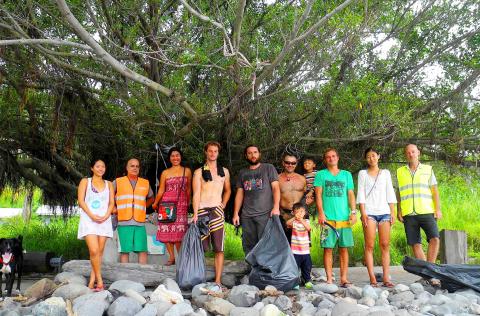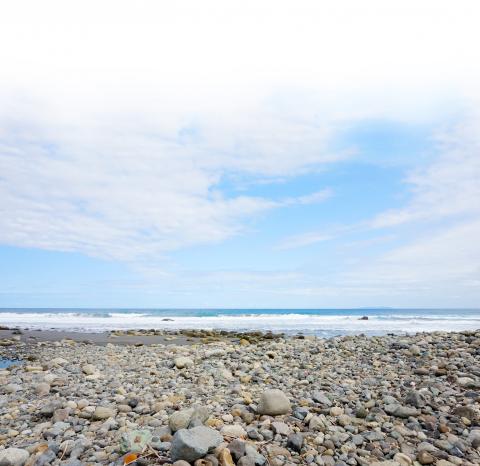Home to a tight-knit community of artists, musicians and surfers, Taitung County’s Dulan Beach has long held a reputation for having one of the most pristine coastlines in all of Taiwan. But lately, its beauty has waned because of the increased number of fishing nets, foam boxes and plastic bottles washing up on its shores.
Saddened and appalled by the amount of litter he saw during a walk by a bay near Dulan earlier this year, artist Tim Joel founded the Facebook page, Only Solutions, to draw attention to the pollution. The group is organizing their first-ever Dulan Beach cleanup tomorrow afternoon.
“We are not just here to function as free garbage collectors,” says Michael O’Neill, a member of Only Solutions.

Photo courtesy of Only Solutions
The group’s strategy is two-pronged. In the short term, they will focus on education in the form of hosting presentations at local schools and organizing monthly clean-ups to raise awareness of the harmful effects of environmental pollution.
In fact, they have been in touch with the Rising Sun Surf Inn, a hostel and surf shop that has been active in organizing clean-ups in Yilan County, for suggestions, and hope to connect with other environmental groups in the future.
“It’s a way to harness the collective goodwill and energy in the local community to take immediate action and produce positive results,” O’Neill tells the Taipei Times.

Photo: Dana Ter, Taipei Times
The second and more long-term approach is applying pressure on the local government to implement laws that will force beachgoers and fishermen (since a lot of fishing nets have been washing ashore) to be more mindful of the environment.
O’Neill believes that at the very least, officials should install more rubbish bins and signs instructing people to use them. As simple as it sounds, O’Neill says, it has been a long and frustrating process trying to convince the government to fulfill this basic service.
“Getting the local council to recognize the value of making beautiful, natural beaches a feature tourist attraction for the region is still an ongoing challenge,” O’Neill says.
In the interim, Only Solutions has set up their own rubbish bins, and artists will be painting them at tomorrow’s beach clean-up.
“We want this to be a place where parents, like Tim, won’t have to describe to their kids what it used to be like,” O’Neill says.
If you plan on attending tomorrow’s beach clean-up, be sure to bring gloves, garbage bags and metal barbecue thongs for picking up trash — and lots of sunblock.

Taiwan has next to no political engagement in Myanmar, either with the ruling military junta nor the dozens of armed groups who’ve in the last five years taken over around two-thirds of the nation’s territory in a sprawling, patchwork civil war. But early last month, the leader of one relatively minor Burmese revolutionary faction, General Nerdah Bomya, who is also an alleged war criminal, made a low key visit to Taipei, where he met with a member of President William Lai’s (賴清德) staff, a retired Taiwanese military official and several academics. “I feel like Taiwan is a good example of

March 2 to March 8 Gunfire rang out along the shore of the frontline island of Lieyu (烈嶼) on a foggy afternoon on March 7, 1987. By the time it was over, about 20 unarmed Vietnamese refugees — men, women, elderly and children — were dead. They were hastily buried, followed by decades of silence. Months later, opposition politicians and journalists tried to uncover what had happened, but conflicting accounts only deepened the confusion. One version suggested that government troops had mistakenly killed their own operatives attempting to return home from Vietnam. The military maintained that the

Jacques Poissant’s suffering stopped the day he asked his daughter if it would be “cowardly to ask to be helped to die.” The retired Canadian insurance adviser was 93, and “was wasting away” after a long battle with prostate cancer. “He no longer had any zest for life,” Josee Poissant said. Last year her mother made the same choice at 96 when she realized she would not be getting out of hospital. She died surrounded by her children and their partners listening to the music she loved. “She was at peace. She sang until she went to sleep.” Josee Poissant remembers it as a beautiful

Before the last section of the round-the-island railway was electrified, one old blue train still chugged back and forth between Pingtung County’s Fangliao (枋寮) and Taitung (台東) stations once a day. It was so slow, was so hot (it had no air conditioning) and covered such a short distance, that the low fare still failed to attract many riders. This relic of the past was finally retired when the South Link Line was fully electrified on Dec. 23, 2020. A wave of nostalgia surrounded the termination of the Ordinary Train service, as these train carriages had been in use for decades